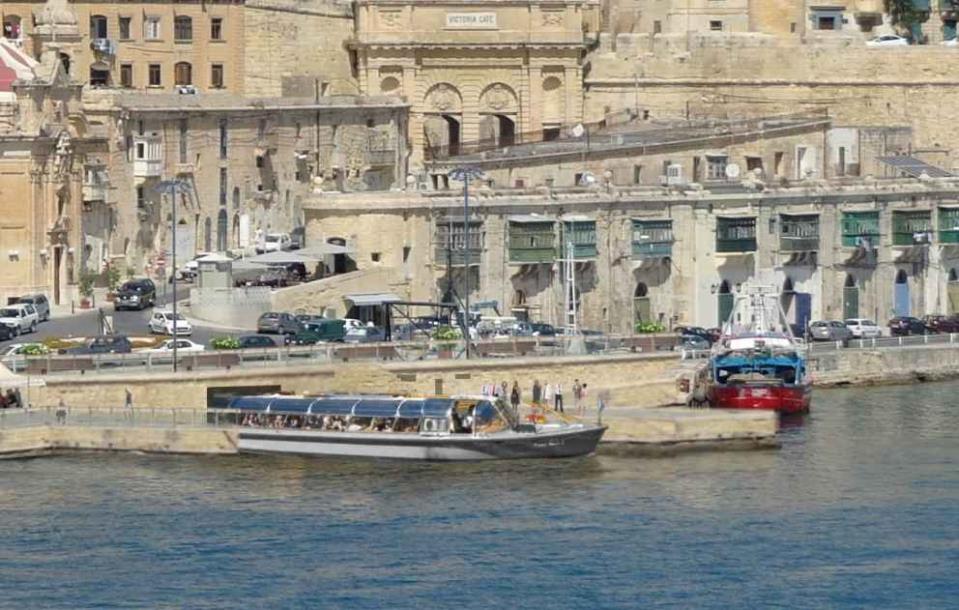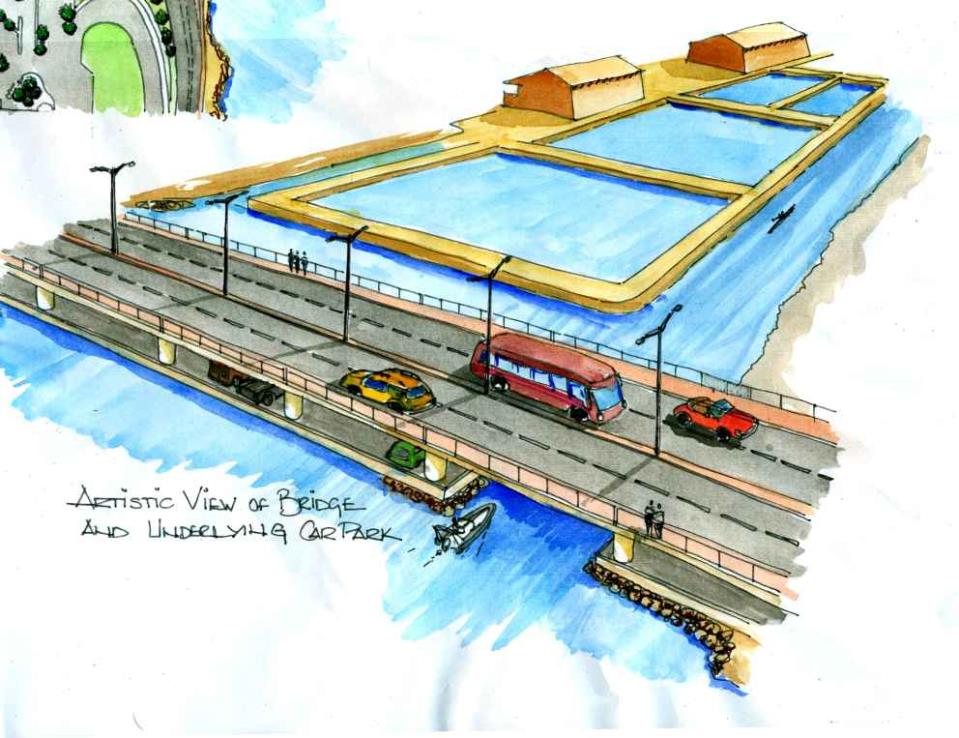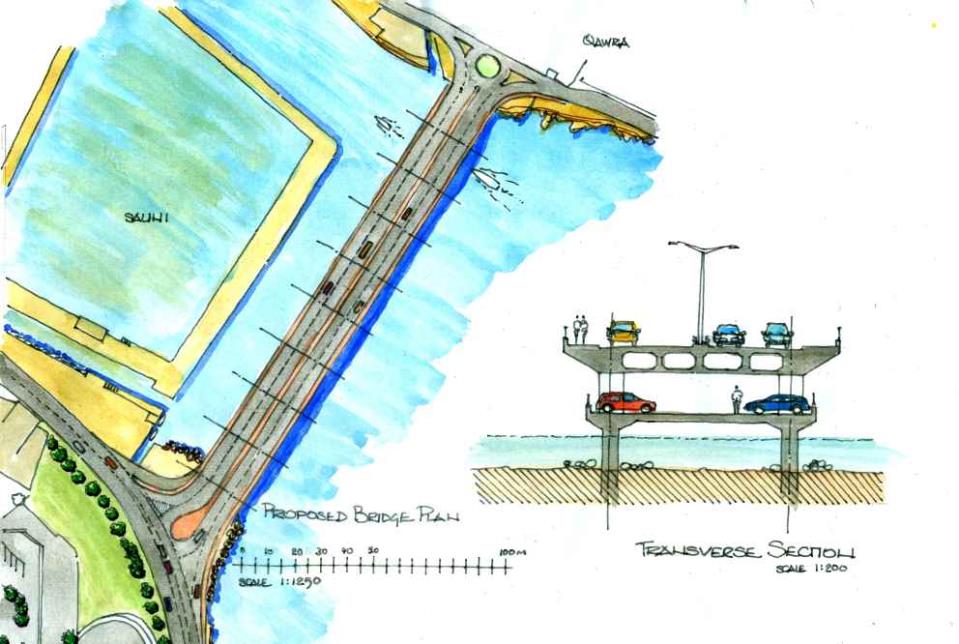Hotelier and construction magnate ANGELO XUEREB, renowned for his innovative infrastructural proposals, speaks to Duncan Barry about his latest proposed alternative mode of transport project: an 800-metre sea tunnel linking Sliema with Valletta and Cottonera. Mr Xuereb, who is chairman of AX Holdings, said that the tunnel project itself would cost some €10 million while the river boats would cost an additional €3 million.
Mr Xuereb pointed out that the government has nothing to lose by giving the green light to his latest project, since he would be bearing the full cost of implementing it, a total €13 million.
He said that nowhere in the world is a public transport project sustained solely by the private sector but he has no qualms in putting money into this project.
The project can run throughout the year, since it involves the use of ferries to transport passengers in the relatively calm water from Sliema to Marsamxett and then simply sail through a seven-metre-high tunnel beneath Valletta and on to Cottonera.
“This project would have the potential to generate revenue from locals and foreigners alike but at the same time it will serve as a good alternative to other transport systems, while the fares for the ferry won’t break anybody’s back,” Mr Xuereb said.
AX Holdings is the only company to have responded to an Expression of Interest issued by Projects Malta – a government company that works in Public Private Partnerships promoting and developing sustainable PPP joint ventures. This project, however, is a joint initiative between Captain Morgan Cruises, owned by the Zammit Tabona family and AX Holdings.

A call for Expressions of Interest was issued for the design, construction and building of various modes of transport in the Grand Harbour area and Marsamxett Port. It was issued in August and asked that the proposed projects offer alternative transport solutions. Proposals had to include efficiency and effectiveness and would not include the use of motor vehicles. The proposal is now at evaluation stage.
Asked if it didn’t cost a bomb each time to have his proposals studied in great detail, Mr Zuereb said that he spends a significant amount of money on hiring consultants, be they foreign or local, to put an idea down on paper and eventually submit a tender. “I obviously want to ensure that the studies are really thorough since I want the project to be water-tight,” he said.
The project, he said, could be finalised within 18 months – if it does not take too long for the permits to be issued – in time for Valletta 18. “Whoever evaluates the tender will be able to see that the plans go into extreme detail,” Mr Xuereb said.
In his opinion, the project can run throughout the year, since the ferry can cross from Sliema to Marsamxett since ferries will remain in the harbour area – and then simply sail through the seven-metre-high tunnel beneath Valletta and then from Lascaris linking it to Cottonera. He said the project would serve as an alternative for tourists who wished to have dinner in Cottonera, for instance, and catch a ferry back to Sliema late at night or in the early hours of the morning instead of using their car or hiring a taxi, since it is highly unlikely that buses would be running that late.
“The project,” he said, would also encourage activities such as dinner cruises round the harbour, for example, and people working in Valletta could also make use of the ferry,” he pointed out.
Eventually, said Mr Xuereb, he is sure that other entrepreneurs would jump at the opportunity to invest in projects such as car parks in the vicinity of the ferry’s departure points. In the event that car parks were not sited within walking distance of the ferries, a shuttle service would be provided.
When asked if the project, minus the car parks, would still work, Mr Xuereb said: “The project, as it has been presented, will definitely work.
“Statistics show that since the introduction of the current ferry service from Sliema to Valletta and Valletta to Cottonera, passenger numbers have increased year after year.

“Our proposal will it make much easier for people to access the centre of Valletta due to the fact that the landing will be situated in Valletta harbour, close to the Barakka lift” he said.
He explained that when his proposal for the ferry was designed, experts ensured that the excavation work required to build the 800-metre tunnel would not disturb the business community in general and would not encroach on private land, so that as little inconvenience as possible would be caused.
As for safety, he ruled out the possibility that anything could go wrong in the tunnel while the river boat is in motion. “The tunnel will be illuminated and it is safer than sailing in open water, as the water in the tunnel will be only 2.5 metres deep,” he said.
Many people will know that this is not the first proposal made by Mr Xuereb. Sifting through newspaper cuttings dating back to 1989, Mr Xuereb said that his first proposal was a master plan for Valletta to help revive business at the time.
In an article published in The Times back in January 1989, he had said the country had reached the stage where the government had to take a bold decision and look at new forms of transportation, such as an underground transport system combined with an elevated railway system, referring to what is commonly referred to today as a ‘monorail system’. Not that we needed any confirmation that the traffic problem has been with us for quite a long time and that successive governments have been reluctant to turn certain proposals into reality, but this says it all.
But Mr Xuereb did not give up and 23 years later, in 2014, he revived his monorail idea but this time around settled for a monorail system that would be partly above ground level and a ferry service linking Sliema, Valletta and the Three Cities.
“Development and infrastructure is in my blood,” he said. “I am very patriotic and it bothers me to see that our beautiful harbour is under-used,” he continued.
“If you go to Hong Kong or Stockholm, you can see that ferries are commonly used as a mode of transport. So why is it that we do not use our harbour as do other countries?” he asked. “I mean, nothing beats our harbours. In Belgium and France, for instance, there are rivers but at least they are made good use of,” Mr Xuereb said.
It is worth noting that Malta had proposed a total of €1,629 billion in projects that will compete for financing from an investment plan announced by European Commission head Jean-Claude Juncker. This includes a proposal of €142 billion for a monorail system. But speaking in Parliament recently, when the issue of traffic was discussed, Prime Minister Joseph Muscat said there was a need for caution on the subject of introducing a monorail system “since the infrastructure used for monorails may jar with our historic buildings.”

“A monorail system by itself won’t work’ Mr Xuereb said. “It has to be part of an integrated transportation system.”
He said that, some 23 years ago, he had joked that at the rate things were moving, permits would be issued in 20 years’ time but here he is, 24 years later, coming up with similar proposals that, as yet, have not been transformed into reality. “Give the civil service a routine project and they will get it off the ground, but as soon as you present a project out of the norm, you lose them,” he said with a smile.
Another of Mr Xuereb’s proposals which, unfortunately, cannot be implemented for another next five years for the simple reason that EU funds allocated to the Coast Road project would be lost if the project is ‘tampered with’, is a bridge between Salina (away from the salt pans) and Qawra to improve traffic flows in the Kennedy Grove area.
On this point, Mr Xuereb said that it is good that the Coast Road project has been implemented, but it has done nothing to ease the bottlenecks of cars entering Bugibba from near Kennedy Grove.
“When the Coast Road was being upgraded, I suggested to government that a bridge be built between Salina and Qawra. But the government explained that, for the time being, a bridge cannot be built since the Maltese government would lose the EU funds allocated to the Coast Road project.
“I therefore suggested that at least a roundabout be built now so that in five years’ time or so, in the event that a low, 200-metre long bridge is built, no other infrastructural work would be required as the bridge would simply link up with the road, he said.
Mr Xuereb’s idea also includes a car park that does not encroach on the salt pans.
“Having a bridge where I am proposing would considerably reduce the flow of traffic to Qawra,” he pointed out.
“I am almost certain that the sea ferry proposal will be taken up since, as I said earlier, Malta has nothing to lose but much to gain from a project of this sort,” he said.